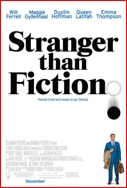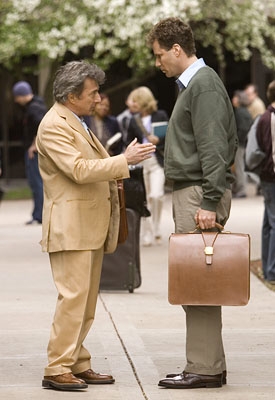
Return to 2006 Films
Alphabetic
Index of 2006
Films
_______________
An Inconvenient Truth
Big Bad Swim
Brokeback Mountain
Capote
Cinderella Man
Crash
The Departed
The DaVinci Code
Eron: The Smartest
Guys in the Room
Good Night and
Good Luck
Half Nelson
History of Violence
Hollywoodland
Hotel Rwanda
Little Miss Sunshine
Journey from the Fall
March of the Penguins
Millons
Million Dollar Baby
Munich
Prairie Home Companion
Prime
Quinceanera
Sideways
Star Wars III:
Revenge of the Sith
Thank You for Smoking
The Three Burials of Melquiades Estrada
The Sea Inside
United 93
War of the Worlds
Walk the Line
World Trade Center
 Stranger than Fiction A Review by Tom Condon, OP (St. Martin Province) Harold Crick (Will Ferrell) lives a perfectly routine life as an IRS agent. He gets up at the same time, brushes his teeth with the same number of strokes, counts his steps to the bus stop, and seems content with his dull life. One day, out of nowhere, Harold hears a woman’s voice in his head, narrating his life. Naturally, this disturbs him greatly. It’s as if he is the character in a novel. When he describes this to a therapist, she refers him to a literature professor (Dustin Hoffman). In the meantime, Harold is assigned to audit Ana (Maggie Gyllenhall), a somewhat nonconformist baker in a small bakery/coffee shop. At first, the two from different worldviews lock horns. But, this being the world of the movies, we know they will eventually fall in love. And so they do.
Sound strange? Sure. Stranger than Fiction takes the viewer deep into the territory of Charlie Kauffman (Adaptation, Being John Malkovich). This time the director is Marc Forster, who also dealt with literary types, imagination, and even life and death in Finding Neverland. The big question with films like these is: will the viewer accept its fantastic premise, or just seem too strange and quirky? In order to work, such films must engage the viewer at a deeper level, usually be appealing to a sense of humanity. From the beginning, Stranger than Fiction hooked me. I was intrigued by its visual style, by its subtle humor, and by Harold’s predicament. At the beginning of the film, it would have made little difference whether Harold lived or died, since he was barely living at all. As he begins to discover himself and find that he cares for another person, Harold becomes a character we care about. Will Karen really kill him in order to complete her novel? Or will he be allowed to explore his relationship with Ana?
As you can tell by now, I loved this movie. It was clever, but more than that, it kept me thinking, and caring about its characters. Had the movie not engaged me, I think I would have been totally frustrated by its absurd premise that Harold could hear Karen’s voice in his head. I also liked the funky alternative music score. The fine cast does a great job with this unusual story. Will
Ferrell plays totally against type, and is believable as Harold.
But it’s the great Emma Thompson who steals the show as
the writer agonizing over how to conclude her own novel and, at
the same time, Joe’s fate. Her scenes with Queen Latifah,
also playing against type as her no-nonsense assistant, are wonderful.
Maggie Gyllenhall is also very good as Ana. In a lovely scene,
she startles Harold by the simple act of giving him some freshly
baked cookies, asking nothing in return. Harold is totally confused
by a simple act of generosity, until he begins to understand the
significance of gift. Any movie in which a character is won over
by a gift of cookies is more than OK by me. |
Film Synopsis: An IRS auditor suddenly finds himself the subject
of narration only he can hear: narration that begins to affect
his entire life, from his work, to his love-interest, to his death |
 Home | Contact Us | DLC Dominican Life | USA is sponsored by the Dominican Leadership Conference, the networking organization for elected leaders in the USA. Dominican Life | USA © 2002-2007, All Rights Reserved Web Editor: Anne Lythgoe, OP |
|---|


 Meanwhile,
Joe eventually discovers that the voice he hears in his head comes
from Karen Eiffel (Emma Thompson), who is indeed writing a novel.
Joe is his main character. The trouble is the Karen’s main
characters always are killed off. So she plans the same fate for
Joe.
Meanwhile,
Joe eventually discovers that the voice he hears in his head comes
from Karen Eiffel (Emma Thompson), who is indeed writing a novel.
Joe is his main character. The trouble is the Karen’s main
characters always are killed off. So she plans the same fate for
Joe.  I
liked Stranger than Fiction because it was different, non-formulaic.
I liked it because it asks questions about life and death. What
is the meaning of life? Does it matter whether a good man dies,
and how he dies? What if he dies to save another? Is there a redemptive
power in love? How much control do we have over our destiny? Is
there such a thing as choice? The only way to deal with these
existential questions is through living out of the mystery of
life; taking chances, falling in love. Otherwise, what’s
the point? Does this sound religious, even Christological? You
bet. I’d say more, but don’t want to ruin the ending.
I
liked Stranger than Fiction because it was different, non-formulaic.
I liked it because it asks questions about life and death. What
is the meaning of life? Does it matter whether a good man dies,
and how he dies? What if he dies to save another? Is there a redemptive
power in love? How much control do we have over our destiny? Is
there such a thing as choice? The only way to deal with these
existential questions is through living out of the mystery of
life; taking chances, falling in love. Otherwise, what’s
the point? Does this sound religious, even Christological? You
bet. I’d say more, but don’t want to ruin the ending.